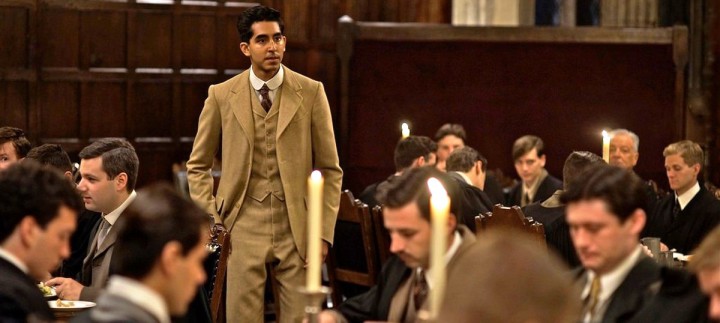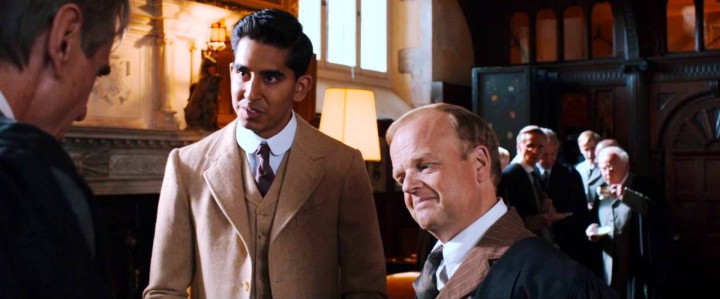People who don’t like Matt Brown’s very likable biopic on Indian mathematician Srinivasa Ramanujan (Dev Patel) The Man Who Knew Infinity seem to fall into one of two categories: those who want more about mathematics (heaven forbid) and those who simply want a more narratively challenging film. In other words, they don’t so much dislike it for what it is as for what it isn’t. While I might have preferred a more daring approach — see Don Cheadle’s Miles Ahead — I don’t mind this more biopic-basic take on the material. It’s not earth-shattering, no, but neither has it been turned into a makeshift (and sanitized) romance like The Theory of Everything (2014). The Man Who Knew Infinity is an intelligent (but not impenetrable) drama of the cozy British kind with a degree of wit and characters who are easy to like. It has impeccable performances from its tony cast — Patel, Jeremy Irons, Toby Jones, Stephen Fry. It has an interesting, if somewhat sudsy, story to tell. It does what it sets out to do and does it well. I enjoyed it and was entertained. I can reasonably ask for no more.
The story follows Ramanujan going to Cambridge, leaving his wife (Devika Bhise) and family behind, after math professor G.H. Hardy (Irons) sees samples of his work that Hardy at first thinks is a practical joke by his colleague, professor Littlewood (Toby Jones). In itself, this has all the making of every culture clash — both dramatic and comedic — imaginable, but The Man Who Knew Infinity soft-pedals this stuff. Some of it is certainly there. It would be impossible to deal with the story of an unschooled Indian math genius in England during the 1914-1920 era and not address the racism component. But the film doesn’t dwell on it, despite the fact that it’s always an undercurrent. It’s clear that the professor he casually outclasses is more appalled by the fact that a “wog” did it than anything else. (Even those sympathetic to Ramanujan sometimes evidence a pragmatic racism, as when Littlewood expresses his disbelief that “a dark face” will ever adorn the portrait walls at Cambridge.) There’s also a scene, handled tastefully and not in the least as a joke, where the vegetarian Ramanujan inadvertently takes a bite of a potato that’s been cooked in lard. The film is surprisingly adept in such matters.
Much of the film hinges on the close — but almost invariably reserved — friendship between Ramanujan and Hardy. It’s an odd-couple pairing, sharing only a working-class background. We have the atheistic Hardy and the deeply religious Hindu Ramanujan, whose common ground is a love of numbers, viewed by the latter as his means of communicating with God. This almost — but only almost — makes Hardy rethink his position. At least he finds it as good an explanation as any of mathematics, which he considers an art. Ramanujan, it might be noted, thinks that Hardy does believe in God, but is convinced the supposed atheist merely thinks God doesn’t like him very much. In this the film finds much of its dramatic tension. Equations, answers and revelation just appear to Ramanujan, who finds the English obsession with proofs (to demonstrate how he arrived at these things) peculiar, pointless, annoying and even counterproductive.
Where The Man Who Knew Infinity is on its shakiest ground in the biopic cliché department isn’t really its fault. Realistically, the film simply cannot be blamed for Ramanujan contracting tuberculosis, which happens to have been the most popular — and romanticized — disease of 19th century fiction (and sometimes fact). This time it isn’t the movie’s doing, but history’s. (Baz Luhrmann added the disease as a period detail in his 2001 film Moulin Rouge!.) However, writer-director Matt Brown can’t seem to resist using it in such a clichéd manner that it feels like we’re watching Cornell Wilde’s Chopin decorously cough up photogenic tubercular blood in that hoariest of biopics, A Song to Remember (1945). Certainly, it’s not enough to sink the film, but I’d be lying if I didn’t admit that it scored an unintentional laugh from me. Still, as I said, I was mainly entertained by this standard treatment that allowed me to enjoy actors I like in roles they excelled in. Rated PG-13 for some thematic elements and smoking.








Before you comment
The comments section is here to provide a platform for civil dialogue on the issues we face together as a local community. Xpress is committed to offering this platform for all voices, but when the tone of the discussion gets nasty or strays off topic, we believe many people choose not to participate. Xpress editors are determined to moderate comments to ensure a constructive interchange is maintained. All comments judged not to be in keeping with the spirit of civil discourse will be removed and repeat violators will be banned. See here for our terms of service. Thank you for being part of this effort to promote respectful discussion.